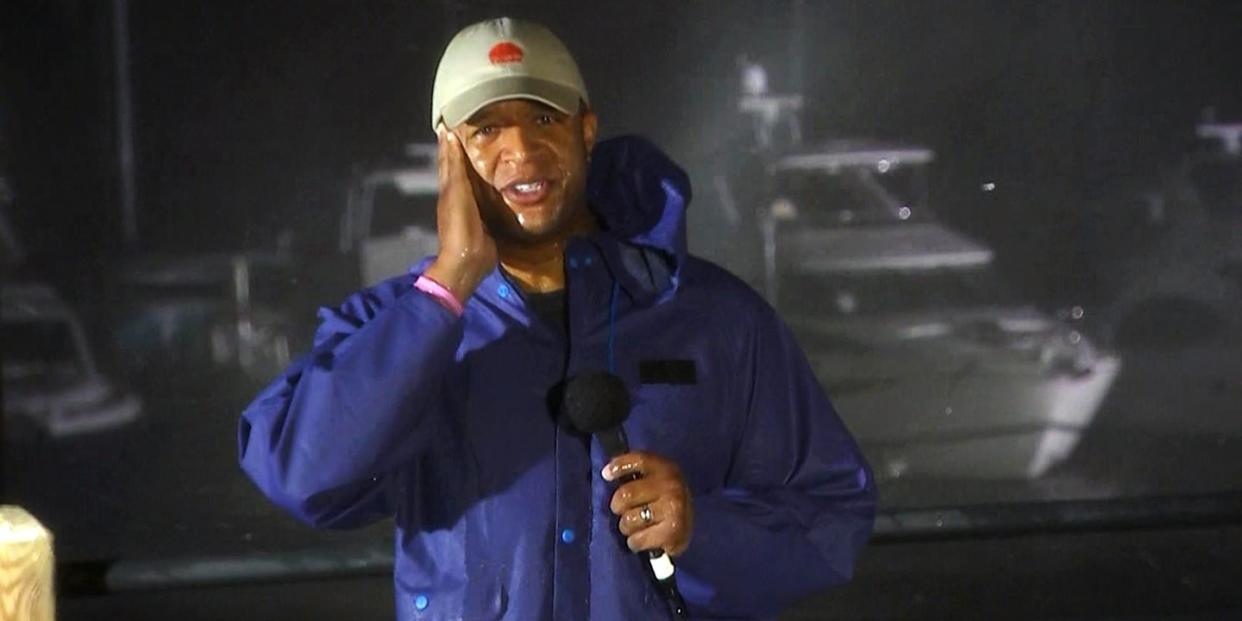Are Dangerous Live Reportings During Hurricanes Really Worth It?

Hurricane Florence made landfall in North Carolina Friday morning as a Category 1 storm. Its winds have weakened from earlier in the week, but it is still expected to pose significant danger-particularly through a resulting storm surge that's already reached 10 feet. The president is rightly urging caution, and also retweeting FEMA messages urging people to "avoid spreading false information" about disasters-another one for the shameless files. But the show has now moved to cable news.
Yes, the ritual has begun: news reporters are sent out by producers and news directors to risk life and limb in search of live shots where they are subjected to the raw power of Mother Nature, buffeted by the wind and rain as they yell, semi-comprehensibly, into a microphone to show Just How Bad This Storm Is. You know, because nobody would know hurricanes are dangerous otherwise.
Here's a Fox News correspondent narrowly avoiding serious bodily injury:
Fox News reporter, absurdly reporting live #HurricaneFlorence, nearly gets smoked by a flying piece of roof pic.twitter.com/jzRhjbG9AG
- Aaron Rupar (@atrupar) September 14, 2018
Here's a local news guy who...they're not even listening to?
This reporter in the #WilmingtonNC area battled strong winds and heavy rain as #HurricaneFlorence made landfall near Wrightsville Beach. https://t.co/pwUbOwT3jO#NCwx #Wx #Florence pic.twitter.com/yw4qyxNxVH
- WXII 12 News (@WXII) September 14, 2018
Here's CBS News reporter David Begnaud in some significant bother:
WATCH: CBS News reporter @DavidBegnaud has to end live shot early as Hurricane Florence's powerful winds make it to Morehead City, North Carolina. https://t.co/FoxbG2Voz5 pic.twitter.com/r10uRDEQYr
- CBS News (@CBSNews) September 13, 2018
It's been said many times before, but it is completely unnecessary to send reporters into these hazardous conditions. People know there is a hurricane, and they know it's dangerous (usually because of great reporting in the lead-up from these same organizations). The reports are pure spectacle-an extreme visual experience to keep viewers tuned into coverage. If you needed further proof, here's a CNN reporter getting absolutely demolished by Mother Nature while a Hurricane Meter is displayed at the bottom of the screen:
John Berman subject to Chad's 'Fake News' of EyeWall landfall
Seriously tho, you have to watch this. I'm 😂#BrokenPromises #Florence pic.twitter.com/KP21PY5nqq- gary (@gporter812) September 14, 2018
Reports from the studio are a public service, but viewers aren't really learning more about the storm from the reporters stationed in harm's way. This is where cable news becomes infotainment. It's like one of those CNN panels during election season where everyone's screaming at each other, except in this case, someone could get killed. (Earlier this year, two journalists were killed covering a storm.) Rather than the continual election-return updates from Wolf Blitzer and Jon King, we get Wind Speed Updates.
By now, it's clearly a waste of time to ask networks not to send their employees out in these conditions. They see too much profit in it, and anyway, all their competitors are doing it. How can they not have The Apocalypse Live Shot?
What we might ask is that they devote at least as much airtime and resources to covering the aftermath of the storm as they do the lead-up and the landfall. We might also ask they stay significantly longer in the affected area than they traditionally have-or at least send someone back often enough to get a real grasp on whether the recovery is adequate. To his credit, the David Begnaud featured above stayed in Puerto Rico for months last year reporting on the disastrous recovery there. If it changes the calculus for anyone else, he won a George Polk Award for it.
('You Might Also Like',)

